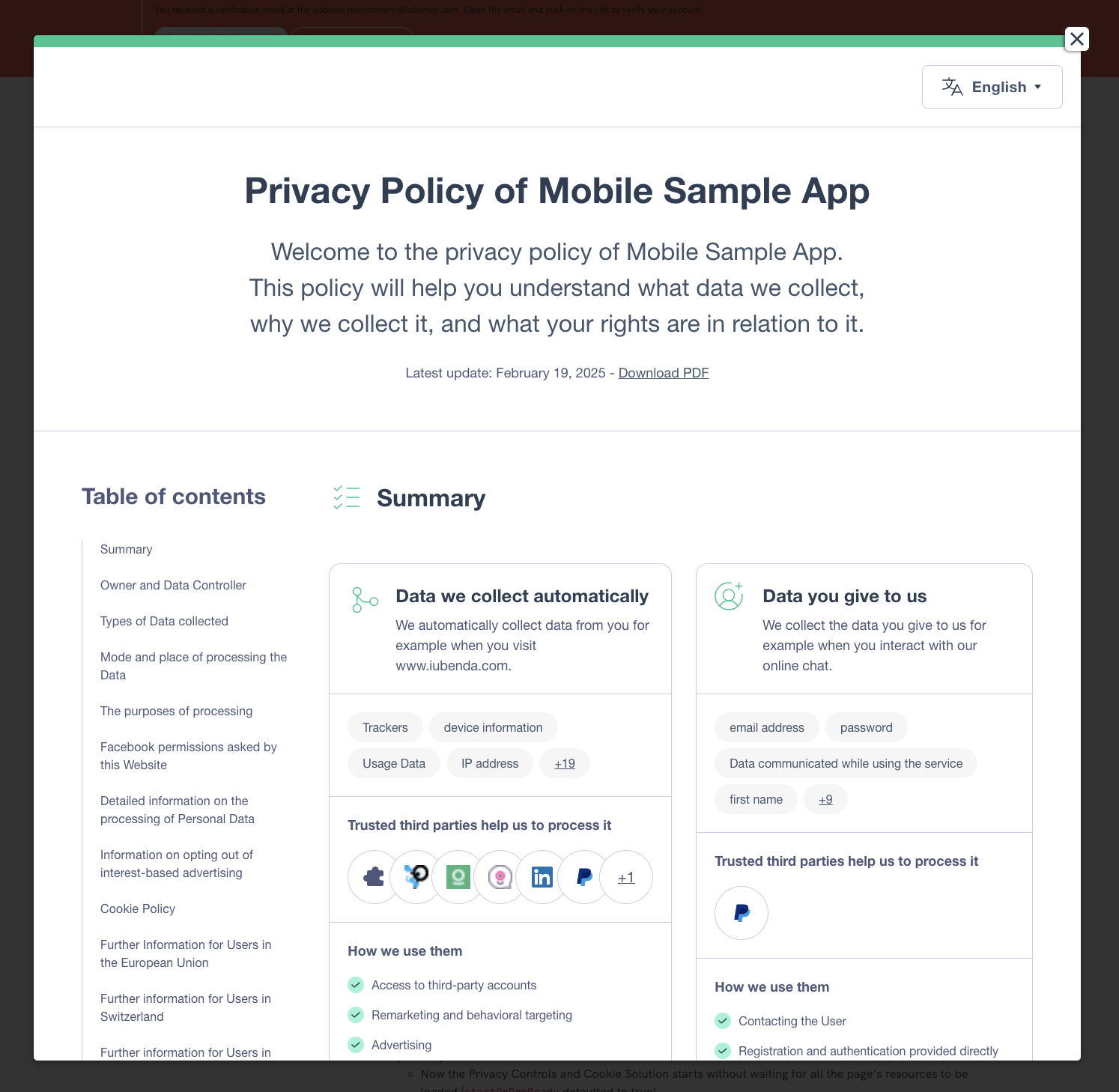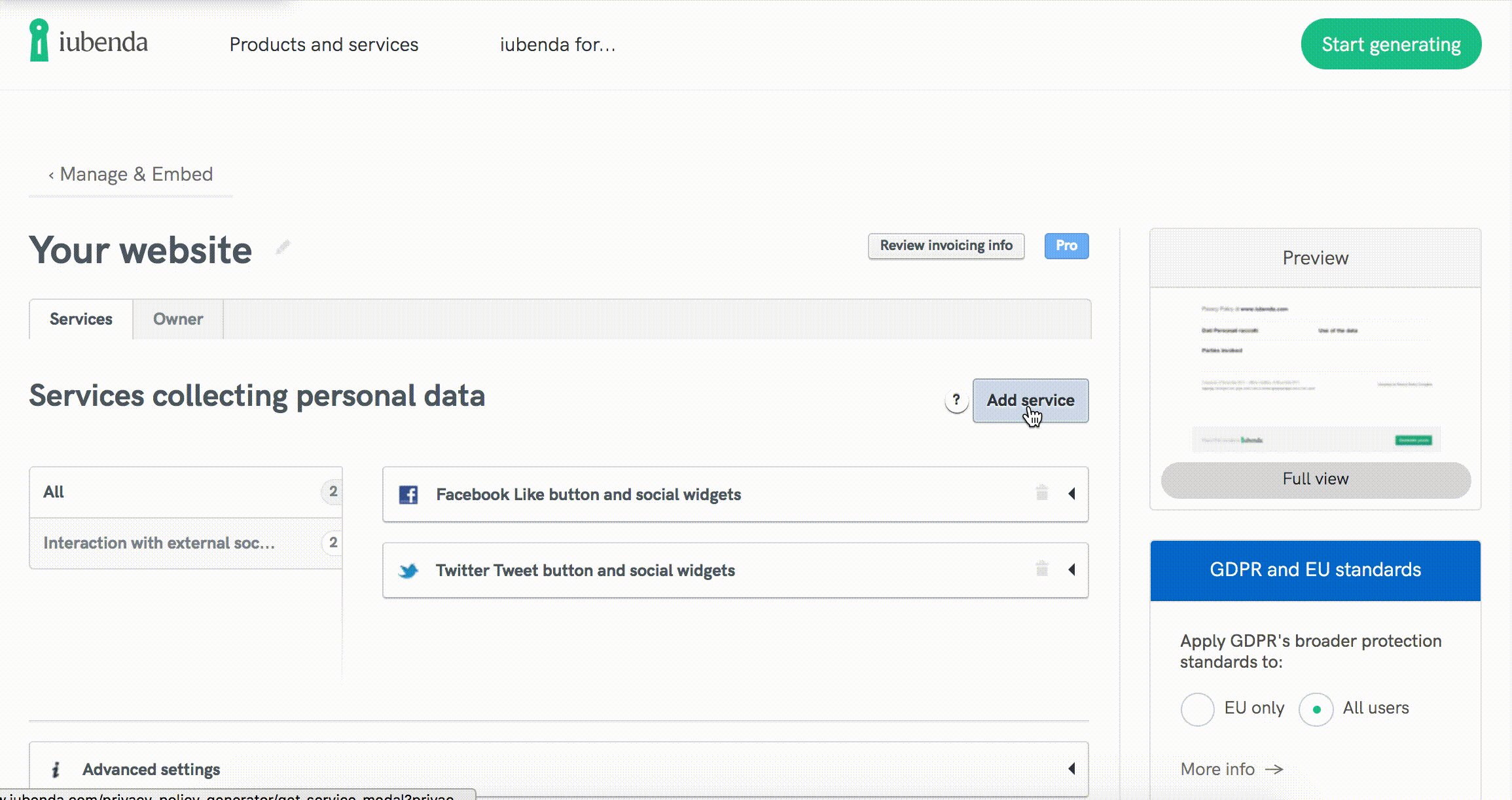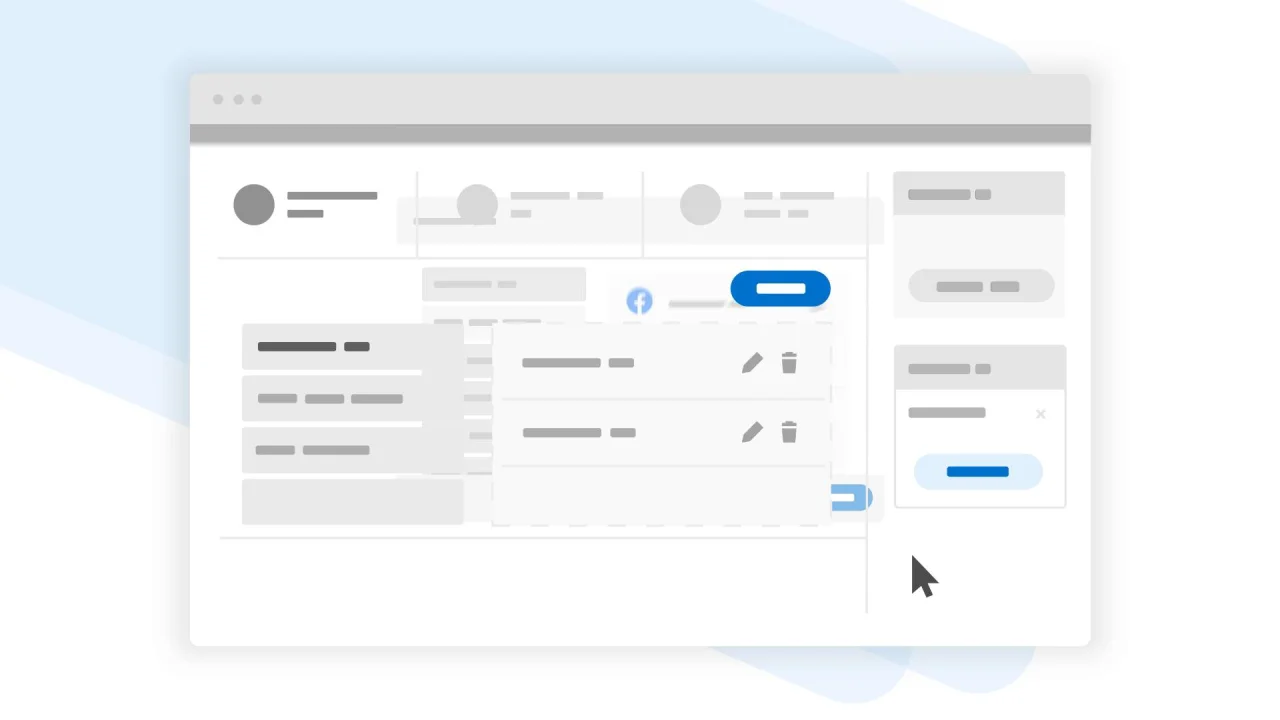A privacy policy document states whether and in what manner a site gathers, utilizes, disseminates, or monetizes the personal data of its visitors. These documents are required under most global laws, such as the GDPR, CPRA, and LGPD.
Keep reading to learn everything you need to know about privacy policies and see an example here.
Short on time? Jump to ⬇️
- What is a privacy policy?
- What is a standard privacy policy?
- Do I need a privacy policy?
- What happens if you don’t have a privacy policy?
- Privacy Policy vs. Cookie Policy: What’s the difference?
- Is it illegal to copy a privacy policy?
- How do I create a data privacy policy?
- Can I use a privacy policy template?
- What should be in a privacy policy?
- What are some examples of privacy policies?
- What is an example of privacy policy?
- How to generate and manage your own privacy document
What is a privacy policy?
A privacy policy outlines how personal data is collected, processed, disclosed, and protected and is legally required under most privacy laws worldwide.
Privacy policies are aimed at increasing transparency, trustworthiness and accountability in handling personal data.
Different terms have the same privacy policy meaning. It might also be referred to as a:
- Privacy Agreement
- Privacy Notice
- Privacy Page
- Privacy Clause
- Privacy Policy Statement
Besides being legally required, privacy documents may also be mandatory under the terms of third-party platforms like app market places (e.g the App store) and eCommerce platforms – as these companies require partners to comply with applicable law.
What is a standard privacy policy?
A standard privacy policy typically refers to a generic document that outlines how an organization collects, uses, stores, and protects the personal data of users. It’s important to note that it’s only a baseline or a starting point, often adhering only to common privacy practices and legal requirements. A standard privacy policy is designed to be broadly applicable, covering fundamental privacy aspects without being tailored to the specific nuances of a particular business or industry.
As a general rule of thumb, it is always advisable to create a professional document that applies to your unique situation, with detailed clauses. After all, it is a legal document that, by law, should be specific and should accurately reflect and inform users of all your data activities.
Do I need a privacy policy?
Yes, if you have a website or app, it is not only highly recommended but often mandatory to have a data privacy policy document in place. Here’s why:
- Legal Compliance: Many countries and regions have privacy laws and regulations that require website owners to have a privacy policy to protect their citizens’ personal information. For instance, the General Data Protection Regulation (GDPR) in Europe, the LGPD in Brazil, and the CPRA, CCPA, CalOPPA and more in the United States have specific requirements for privacy policies.
- Data Collection and Use: Your policy allows you to clearly communicate the types of information that you collect from users, such as names, e-mail addresses, or browsing behavior. It also outlines the purposes for which you collect this information. For example, to improve site functionality or to provide a personalized experience. This helps users understand how their information will be used.
- User Rights and Choices: A privacy policy informs users about their rights and choices regarding their personal information. It explains how users can access, update, or delete their data, as well as opt out of certain data collection or marketing activities. This gives users control over their personal information and enables them to make informed decisions about their privacy.
- Transparency and Trust: A policy helps build trust with your website visitors and users. It shows that you value their privacy and are transparent about how you handle their personal information. When people know how their data will be used and protected, they are more likely to feel comfortable sharing it with you.
In summary, having a privacy notice is not only recommended, but essential. It helps you comply with legal requirements, build trust with users, and clearly communicate your data collection and use practices.
💡 Don’t have a Privacy Policy yet?
Create one for free, quickly and easily 👉 Generate your Privacy Policy now!
What happens if you don’t have a privacy policy?
If you don’t have a privacy policy, you might run into some big troubles! Here’s what can happen:
- Legal Problems and Fines: There are laws that require you to have such a document, such as the GDPR in Europe, the LGPD in Brazil, and state laws in the United States. If you don’t have one in place, you could be subject to hefty fines and legal problems.
- Losing Trust: Users expect to see a privacy document on your website or app. If you don’t have one, they might not trust you or think you don’t care about their privacy.
- Bad Reputation: Not having a privacy policy can make users and other businesses think poorly of you. It could harm your reputation.
- Business Issues: Some services and partners might not work with you if you don’t have this document, and that could affect how well your website or app works and your earnings.
In Short: Not having a privacy policy can lead to legal trouble, fines, loss of trust, a damaged reputation, and could affect your business operations and revenue. It’s crucial to have one to avoid these problems and to show your users you care about their privacy.
Privacy Policy vs. Cookie Policy: What’s the difference?
In short, both privacy policies and cookie policies contain disclosures related to data privacy. However, they serve slightly different purposes in regard to the disclosures they make. Privacy policies contain general information about the processing of personal data, how and why it’s used, user rights, and more. Cookie policies specifically address the use of cookies, trackers, and similar technologies, and the user’s rights in regard to this.
It’s also worth noting that a privacy policy can often contain a cookie policy as a separate section dedicated exclusively to the legal disclosures required for cookie use.
Let’s look at the differences between privacy and cookie policies in more detail:
Privacy Policies: A data privacy policy outlines how personal information and data are collected, used, disclosed, and protected. It informs individuals about their privacy rights, the types of data collected, the purposes for data processing, data sharing practices, security measures, user rights, and other relevant information. Privacy policies are required by law in many legislations to ensure compliance with privacy regulations.
Cookie Policies: On the other hand, a cookie policy or cookie notice specifically addresses the use of cookies (and similar technologies) on a website. Cookies are small text files that are stored on a user’s device when they visit a website. These files contain data that helps improve website functionality, track user behavior, and provide personalized experiences. A cookie policy explains the types of cookies used, their purpose, how long they are stored, and whether they are first-party or third-party cookies. It also informs users about their ability to manage and control cookie preferences, including opting in or opting out if desired.
💡 Both policies are important to inform users about their privacy rights and ensure transparency regarding data practices on a website.
Is it illegal to copy a privacy policy?
To copy a privacy policy from another website can be illegal as it could be considered a copyright infringement. On top of that, it’s also risky from a legal compliance perspective.
In fact, privacy policies are supposed to reflect the specific data practices of an organization, which are always going to be different from another company’s ones. This means that by copying, you risk having a document that is not compliant and could get you into trouble.
How do I create a data privacy policy?
There are different ways to create a data privacy policy and you’ll need to consider which option is the best fit for your business, taking into consideration important factors like cost, knowledge required, and practicality.
Here are the main options:
- Online Templates: There are many data privacy policy templates available online. Be aware, though, that these templates only provide a basic structure with standard clauses. They should be used as a starting point. In fact, the downside is that they are not tailored to your specific operations nor comply with all the laws relevant to your business.
- Privacy Policy Generators: Online generators like iubenda’s Privacy and Cookie Policy Generator are more sophisticated and professional than templates. They offer customizable options based on your business type, location, and specific data practices. Generators typically have thousands of pre-drafted clauses to tailor the document to your needs. They also have dynamic features to easily integrate your data privacy policy on your site, and update the document at any time.
- Consulting with Legal Experts: For the most comprehensive and professional policy, consulting with legal professionals is clearly a solid choice, especially for the most complex cases. Of course, it comes at a cost and can become quite expensive since your document will require updates in the future.
Can I use a privacy policy template?
Privacy regulations can be complex, and creating a privacy policy can be challenging. A privacy policy template needs to consider factors like your location and the privacy-related activities on your website, and it can be difficult to manage since there are numerous things to address on your site.
As the one managing your website, you have the best understanding of your practices. You know if you use Google Analytics, Mailchimp, contact forms, Facebook Like buttons, or other practices involving user data.
A lawyer could take care of the details and use their own process to create a policy that is tailored to your site. They will review your site, address legal issues, and create a strong policy for your site. Clearly, this process requires a considerable investment of time and money.
Fortunately, there are other tools available like generators that can assist you with this task without being overly expensive.
Generate your fully customizable Privacy Policy in minutes
Generate a free Privacy Policy for your website that is customizable, professional, and drafted by an international legal team. A simple way to handle compliance.
See it in action (0:37)
What should be in a privacy policy?
The exact required contents of a privacy policy depend upon the applicable law and may need to address requirements across geographical boundaries and legal jurisdictions.
Generally, data and privacy laws apply to any service targeting residents of a region, which effectively means that a law may apply to your business whether it’s located in the region or not.
For this reason, it’s always advisable that you approach your (legally mandated) policy with the strictest applicable regulations in mind. You can read more about determining your law of reference here or read our in-depth Legal Overview Guide here.
🤔 Not sure which laws apply to you? Take this 1-minute quiz!
These are the most basic elements that a privacy policy should include:
- Who is the site/app owner?
- What data is being collected? How is that data being collected?
- What is the Legal basis for the collection? (e.g. consent, necessary for your service, legal obligation etc.) – This is more specifically related to the GDPR and EU Law, however, even if you fall outside of GDPR obligations, it’s likely that under many other legislations, you’ll still need to say why you’re processing the personal data of users.
- For which specific purposes are the data collected? Analytics? Email Marketing?
- The categories of sources from which you collect consumers’ personal information. -This is more specifically related to the USA’s upcoming CCPA. You can read more about that here.
- Which third parties will have access to the information? Will any third party collect data through widgets (e.g., social buttons) and integrations (e.g., Facebook Connect)?
- Where applicable, details relating to cross-border/overseas data transfer and which measures were put into place to facilitate this in a safe and compliant way. (This disclosure is explicitly required under EU and Australian laws in particular. Furthermore, there are additional requirements to be met for cross-border transfers in regards to both the EU’s GDPR and Australia’s APPs)
- What rights do users have? Can they request to see the data you have on them, can they request to rectify, erase, or block their data? (under European regulations most of this is mandatory)
- Description of process for notifying users and visitors of changes or updates to the policy
- Effective date of the policy
Use this button to scan your site and detect the services that you may need to declare in your privacy policy.
It’s free & only takes a few seconds
What are some examples of privacy policies?
Examples of privacy policies can vary widely depending on the industry, the type of data collected, and the geographic location of both the business and its users. Here are some examples that illustrate this diversity:
- E-commerce Websites: These policies typically focus on how customer data (like names, addresses, payment information) is collected, used, and protected during online transactions. They also address data sharing with third parties, such as shipping companies and payment processors.
- Healthcare Providers (Subject to HIPAA in the U.S.): Since they collect sensitive personal information, these policies are more stringent, detailing how patient health information is protected, used, and disclosed. They comply with specific regulations like HIPAA.
- Mobile Apps: Mobile app privacy policies address data collected through the app, including location data, device-specific information, and user behavior. They also cover permissions required by the app, like access to the camera, microphone, or contacts.
What is an example of privacy policy?
A privacy policy example serves as a practical illustration of how this document can be structured and what information it should include.
See our own document below for a privacy policy example of how these elements come together, and the key elements typically found in this document:

How iubenda can help you generate and manage a Privacy Policy document
iubenda generates privacy policies that work within the best-practices of various jurisdictions.
- ✅ With hundreds of available clauses, our privacy policies contain all elements commonly required across many regions and services, while applying the strictest standards by default – giving you the option to fully customize as needed.
- ✅ Our policies are created by lawyers, monitored by our lawyers, and hosted on our servers to ensure that they are always up-to-date with the latest legal and third-party requirements.
- ✅ Our privacy policies are easily customizable and also come with the option to include a cookie policy (which is necessary if your website or app is using cookies).
With our Free Privacy Policy Generator the generation process is easy and intuitive:
- Choose Website, fill in your website name or URL, select your language and click on Start generating;
- Click on Generate now under Privacy and Cookie Policy;
- Select and add all the relevant services to your website (i.e. Google Analytics, social media widgets…);
- Generate your privacy policy in one click (all clauses are pre-drafted by lawyers);
- Lastly, copy and paste the code to add the document to your website’s footer;

